Sep 20, 2019

Arupa Freeman, aka Arupa Chiarini, is a painter, writer, and the guiding spirit of the HOME (homeless outreach mobile effort) Van. I call her the Fairy Queen because she has a mass of white-blonde curls, a loose dress, a huge Ha Ha laugh, and an invisible magic wand that invariably produces the right answer to the many quandaries that confront the HOME Van.

I knew the name Arupa Chiarini long before I met her. She and Bob Freeman were founders of the Acrosstown Repertory Theater – they ran it for ten years, writing, producing, directing, acting, administering. It was Gainesville’s out-of-the-mainstream theater venue. So Arupa was part of the Gainesville art scene, and though I occasionally attended plays, I was mostly part of the middle-class women’s do-gooder scene. She was everything cool and hip; I was everything stodgy, even though I’m still a hippie at heart.
I first met Arupa at meetings of the Homeless Coalition – she and her husband were volunteers at St. Francis House, our main homeless shelter. We were trying to create a Safe Space, where homeless people could hang out during the day. (St Francis and other shelters required residents to leave early in the morning.) Like all initiatives that include city government, it involved years of meetings, with everyone saying the same things over and over. It went on for a couple of years, and it resulted in nothing. But it allowed the city to say it was addressing the problem of homelessness.
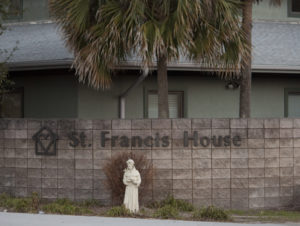 image: shelterlistings.org
image: shelterlistings.org
At one point during the Safe Space campaign some firebrands decided we should camp out in front of city hall. I ran into Arupa at Goerings bookstore and confessed I was scared. Sleeping out on concrete in the middle of a crowd seemed like too much for me, and I had never been arrested. She was scared too, though she had been arrested once for lying down in front of a bulldozer that was about to knock down a tree.
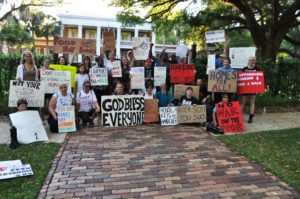 picketing City Hall
picketing City Hall
The plan for camping dwindled into daytime pickets at City Hall. Arupa and I shared a two-hour shift, and that’s when we began to talk – about books, people, our lives, She grew up in Vermont, went to college in Oklahoma, spent years in an ashram in Carmel, and more years as an editor at McGraw Hill. After many years of talking, now I know she was intimidated by me, as I was awed by her. She saw me as the Episcopalian – everything snooty and proper and uppercrust.
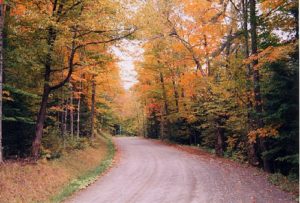 image:Vermontdirtroad from Arupa’s blog
image:Vermontdirtroad from Arupa’s blog
http://vermontandotherstatesofmind.blogspot.com/ (This blog contains a lot of Arupa’s poetry, and some lovely pictures by her and others, as well as a Willie Nelson song.)
Arupa and Bob quit volunteering at St. Francis House when, after a new director took over, it became a place more concerned with regulating than welcoming homeless people. They invited a few friends to meet in their living room, to find a better way to help the people living in the woods, and that was the birth of the HOME Van.
We began in September 2002, with 283 jars of peanut butter, 283 loaves of bread, and $283. Arupa and friends rode around town hanging bags at the end of every trail into the woods, with bread, peanut butter, and a note saying we’d return. The drive-outs evolved until we were delivering homemade soup, food bags, medicine, clothes and socks, tents and other items to campsites and parks twice a week. This continued for over thirteen years. We never got government funding or a grant, but the community supported us, and every month I wrote thank you notes for the checks, large and small, that regularly arrived in the mailbox.
 The HOME Van and Bob’s garden
The HOME Van and Bob’s garden
Four years ago Grace Marketplace, a homeless services center, finally opened in Gainesville. All the HOME Van volunteers were getting older, some sicker. So the Van stopped running, and Arupa, Bob and a few volunteers continued helping the poor and homeless with a food pantry. It’s officially open one day a month, when long lines of people wait patiently at the front door. But food bags and other supplies are always available for whoever knocks on the door, and there are several visitors a day to HOME Van Central, Arupa and Bob’s small house.
The house is half a block from the oldest community garden in Gainesville, six blocks from St. Francis House. The living room contains a refrigerator and shelves of canned food, dried soups, coffee, crackers, over-the-counter drugs and toiletries. Packed food bags, cartons of more food and supplies, tents, blankets and other donations make an obstacle course as we hurry to fill requests from the people at the door.
The walls are covered with paintings by Arupa and Bob, and Arupa’s easel is always at the ready. Bob keeps a flower bed going by their front walk. When their house was Gallerie Bob, there was an art fence festooned with found objects, but that has not been renewed in many years.
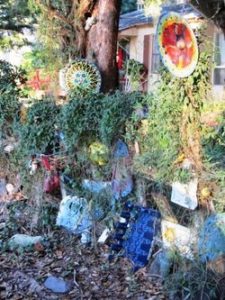 The art fence
The art fence
Arupa and I became close friends through the many years of the weekly drive-outs. She is one of the more literate people I know, particularly well-versed in philosophy, literary classics, and mysticism. She also has an encyclopedic mastery of old G-rated sitcoms and the lives of 1950’s celebrities. When Elizabeth Taylor died, Arupa delivered a long, loving eulogy to me and Larry, my sandwich-making partner at the kitchen table.

Her opinions are fierce and certain topics recur: the villainy of city officials, the imminent collapse of the economy and the environment, increasing poverty and cruelty, the limitations of allopathic medicine. (Arupa relies on homeopathic medicine and acupuncture, and was only sick twice in the years I’ve known her until a serious accident about three years ago.) She delivers her judgments with a conviction that makes my contrarian self silently argue the other side. These are all topics on which I have fuzzy views, often in line with hers, but too little knowledge to speak in the face of certainty.
In the early days of the HOME Van there were fewer homeless people in town, and Arupa and I had more room for frivolity. The first spring Arupa and I colored Easter eggs for the food bags. I took her canoeing down the Itchitucknee, one of many spring-fed streams near Gainesville. She included me in the local art world – once I performed in her play, Primary Colors, at an art gallery, and twice she invited me to read at Wild Iris, our feminist bookstore. For a perennially unpublished writer, these were thrilling occasions.
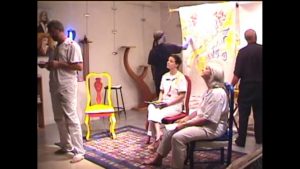 Primary Colors
Primary Colors
https://www.youtube.com/watch?v=6ayAc-v_erk
Sometimes we’d find time for lunch on my backyard deck, or an evening together with Bob and my husband Joe Jackson. The conversation was exhilarating; sometimes I think that between them, Arupa and Bob know everything worth knowing.
The HOME Van is not what it was in the days of twice-weekly drive-outs, and I think we all miss it. In the HOME van we had the privilege of operating from our hearts and instincts, unlike the many good-hearted workers in agencies. We’d often hear from homeless friends that what they liked about the HOME van is we took them at their word. Tell us you’re hungry, we’ll give you some soup; and if there’s enough, we’ll give you seconds. If you need an extra food bag to take to someone else, we believe you. We would rather be snookered occasionally than treat everyone with suspicion.
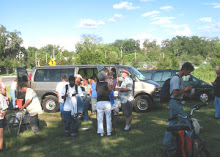 Getting goodies at the HOME Van
Getting goodies at the HOME Van
Despite Arupa’s serious accident, followed by a life-threatening infection, she and Bob have kept that spirit alive. Though food pantry days are pretty frenetic, the three volunteers filling food bags and gathering supplies are always ready with a friendly word and listening ear. And on the other days, when only two or three may seek help, Arupa has the time to talk with people, listen to them. We deal with a lot of people who never come into the organized agencies.

Some people wear bracelets saying, What Would Jesus Do, though I haven’t noticed them acting particularly Christ-like. Many homeless people, and many people who don’t know Arupa, consider her a saint. She is anything but saintly, and HATES the accusation, as she hates receiving awards, but when I’m puzzled about helping people who are down and out, I ask, “What would Arupa do?” She has a clear moral vision that lets us focus on the basic question: how can I help?
From her I learned that if someone is hungry you hand them a sandwich; if they have blisters you give them a bandaid and clean socks. You meet people where they are, with respect and friendship. Some will find their way out of the woods, and you stand ready to support and help with that. Many will not, but if they are hungry they need food. Worthiness is irrelevant, and not ours to judge.
Bob and Arupa do most of the work of the HOME Van. She listens to stories and learns names, and the people who live in the woods have her phone number. When someone is sick, when the city is once again clearing a camp, Arupa knows who to call. She is the truest exemplar I know of my favorite saying: “Light a candle AND curse the darkness.”

ARUPA’S BLOG
For many years Arupa wrote a blog about our drive-outs and the people we encountered. I have been browsing through it as I work on this post,. I can’t stop reading; I’m laughing and crying. She writes beautifully, sometimes prose, sometimes poetry. It brings back so many memories, and her soul shines through. I’m giving you just one sample of the hundreds of posts, and encourage you to go find more.
from http://homevanblogspot.com
A CONVERSATION WITH ‘MOM’ (2009)
She got her street name because she takes care of people. I met her in the winter of 1994/1995. An overly zealous night manager at one of the local shelters evicted an old man with Alzheimers because he smoked in his room. It was a January night with temperatures in the thirties. After a few choice words about “Why the **** didn’t he just confiscate his cigarettes?” Mom took this old guy to her tent and kept him warm through the night.
A few months ago she actually managed to get me to do snuff outreach (with my own money, not Van money). She found an old, old man named Earle living in a shack near Tent City. Earle, who was well into his eighties, showed signs of senile dementia. He had a pack of half-starved cats and he himself was not doing so well.
Mom got some groceries and cat food from me and then said, “I need five dollars toward a tin of snuff.” Arupa: “You’ve got to be kidding. We don’t do snuff outreach.” Mom (tears running down her face): “He’s 86 and he’s been dipping snuff since he was 12 and he’s just sitting out there jonesing and jonesing…” Arupa: “Okay. Snuff outreach it is, coming right up.”
Mom and I were discussing the economy yesterday. She said that Day Labor had dried up so bad people aren’t doing drugs out in Tent City because they don’t have the money. I asked if she knew how business was for the ladies who work on SW 13th Street and she told me that it’s really down. Now, this is a side of the economic downturn you aren’t going to hear about on MSNBC – It’s BREAKING NEWS in the HOME Van Newsletter.
It got me to thinking about the Web of Life with the endless interconnecting tapestry of cause and effect. There is much suffering connected to this Great Recession, and will be for a long time to come. Can it be that there are also little miracles – lotuses growing from the mud – silently sprouting and putting forth roots? People planting vegetable gardens, people playing board games with their children because they can’t afford to go out – people in Tent City getting a “time out” from the nightmare labyrinth of doing drugs and turning tricks – a silent place where something new might grow. I believe in this.
BOOKS! GAMES! SOAP!
That’s what we need. Hallelujah for Spring and long evenings when people can read and play cards. This summer I am going to emphasize recreation in the Socks 4th Avenue section of the Van, with your help. Art supplies are good also, and anything else you can think of that is fun We are also low on personal hygiene products.
ENJOY THE WEATHER!!!!
Love and blessings, arupa

Aug 13, 2019
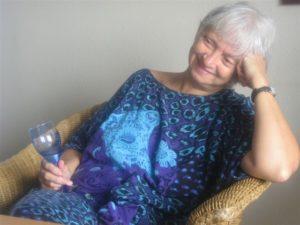
Over thirty years ago my late brother Richard and his wife Esther bought a house on Vinalhaven, an island in Maine. They spent every summer there, and as the years went by, four of their seven grown children and a granddaughter bought houses too.
Every summer at the end of July or beginning of August, children and grandchildren and great grandchildren gather in Vinalhaven for a week, filling all the houses, renting a couple more. We celebrated Richard’s eightieth birthday there, as well as three weddings. My oldest brother Don and his wife used to come from Connecticut to join the gathering. Now the drive is too much for them, but Esther hopes next summer they will fly.
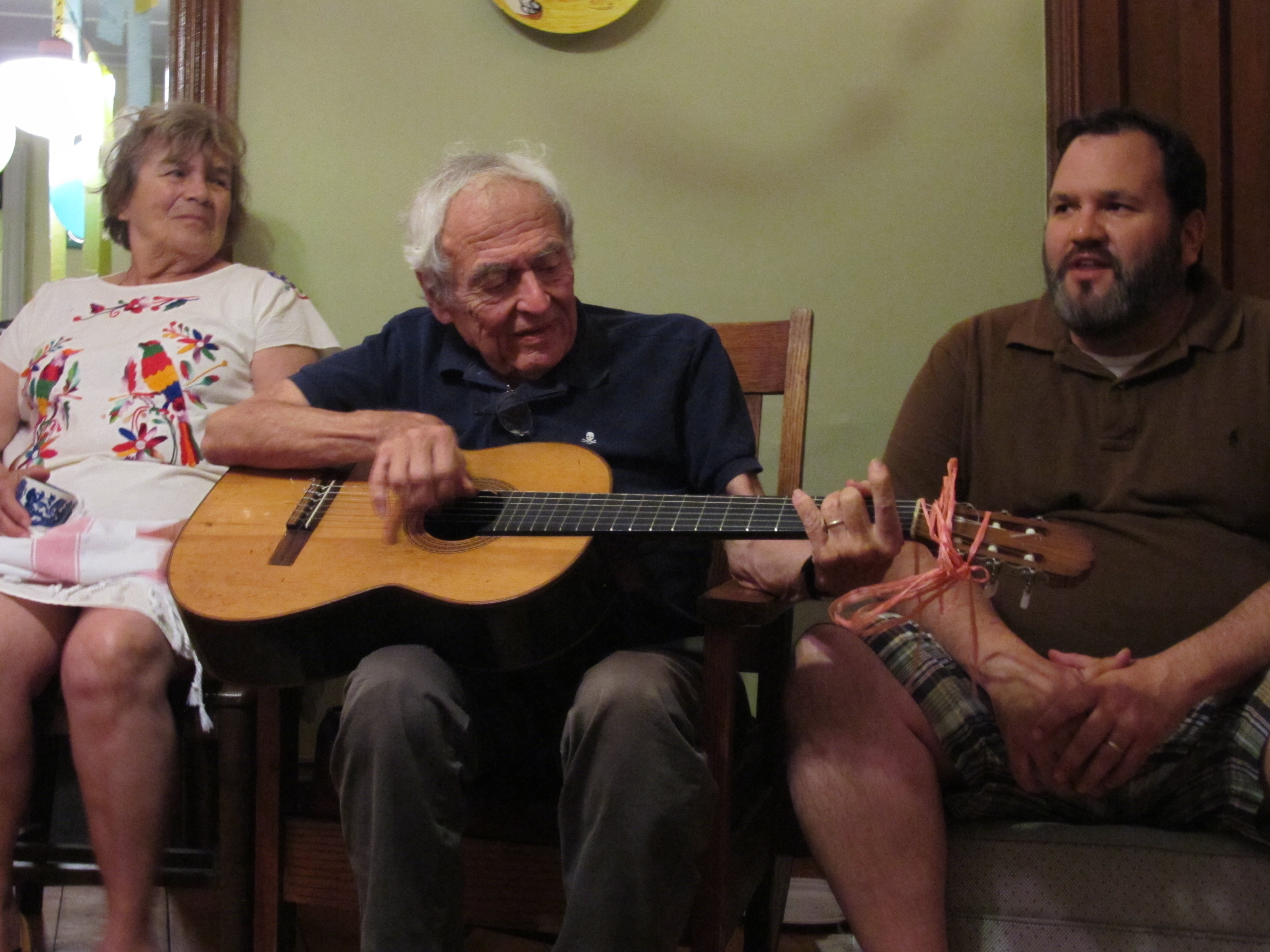
I’ve always envied families who have a summer gathering place where they go every year. Joe’s parents always had a cottage at Crescent Beach in Connecticut, where his mother and aunt and their seven children spent a month in the summer, fathers coming out from the city for weekends. My friend Michelle sings with Other Voices; her song Bradley Beach perfectly conveys her childhood annual trip to the New Jersey shore, the kids crowded into the back seat, the summer thrills changing as they grew from toddlers to teens. Here’s the song
I went up to Vinalhaven several times before I married, but never felt quite comfortable there, and the trek from Florida was daunting. But since Joe and I married and Amanda came to live with us, we have usually managed to rent a house in Vinalhaven for family week. Now it is a magical place for me, a place where I have no cellphone service, wifi is scarce, lobsters are plentiful, icy water comforts my old joints, and beautiful views and beloved family are around every blind curve.

This year, because of Amanda’s school schedule, we couldn’t go for family week, but several family members arrived a couple of days before we left. And this year I went up by myself a week early to stay with my oldest niece Maria.
Like any trip to a magical place, the trip to Vinalhaven is a challenge. It’s full of unforeseen troubles and treasures, and the heroine must overcome many obstacles. I flew out of Gainesville at 7:15, scheduled to arrive in Portland about noon. I was going to spend the night at Luke’s house in Portland and drive to Rockland to get the Vinalhaven ferry the next day. (Rental car agencies and ferry schedules determined this plan.)
But at the gate in Atlanta they were calling for volunteers to take a later flight. They were desperate: the first volunteers got $300, but by the time I arrived it was a $700 American Express gift card good for six months. I thought a moment. I would get to Portand by five thirty instead of noon. Since neither Luke nor his daughter Frances was free my plan in Portland was simply to goof around. So I raised my hand to volunteer, headed to the desk, tripped and landed on my face. The only damage was the rug-burn on my cheek, and the mortification as four people gathered around the 72-year-old woman on the ground asking, “Are you sure you’re all right?”
After my scheduled flight took off with my checked bag, I sat at the empty gate and worked on an application for a 2020 writing residency in Washington – lots of 1200-word essays about me and my aspirations. Then a big thunderstorm rolled in, and all incoming flights were diverted from Atlanta, along with all the flight crews. Our copilot was in Birmingham; the rest God and Delta knew where. Every half hour or so we got a progress report. I went to a restaurant a few gates away and, because of the crowd, shared a table, sushi, and Scotch with a delightful university librarian from Cleveland. (Now that I think of it, I bet I could have scored a dinner voucher).

image: pixabay pexels.com
Back at the gate they were boarding. We were all settled in our seats when they announced an equipment issue, and we all unsettled and returned to the airport. An hour later we were back on the plane and in the air with that uneasy feeling one always has when flying on a plane with a recent equipment issue.
We arrived in Portland at 8:30. I retrieved my suitcase from the baggage office and rolled it up and down ramps to the rental car desk. I was exhausted, and a little worried to be driving in a strange city in the dark, but so glad to finally reach Portland. Then the nice young man behind the desk said, “Ma’am, this driver’s license expired last week.” Sure enough, it had. I had ordered another but it never arrived, and I’d forgotten about it. So I would have to take the bus from Portland to Rockland.
I rolled up and down more ramps and found a taxi with a friendly driver and a GPS to navigate through funky old Portland neighborhoods. When the GPS said we’d arrived, we couldn’t find the house number. The driver waited; “I’m not going to leave you here alone.” I called my nephew and his daughter with no success. A neighbor pulled into a driveway but didn’t know Luke. I climbed up to front porches looking at all the mailboxes, and finally found it. Climbed the long stairs to the second floor, took a welcome hot shower, and fell asleep.

Portland street
The bus ride from Portland to Rockland was uneventful. I didn’t worry about whether we would miss the last Vinalhaven ferry, because in my experience the bus always misses the ferry, and I know what to do. You take the North Haven ferry, find a boy with a boat, and pay him $5 to shuttle you across the water to the wrong end of Vinalhaven, where, if you can make proper phone connections with family, someone will meet you.
Maria did meet me – Luke, the only one with cell service, had left her a note. We went to Esther’s house for dinner and a very welcome glass of wine., and then home for bed.
Maria and I are only ten years apart; she is also a writer. We are kindred spirits and we bump along well together; Maria’s apartment in Washington Heights and house in Vinalhaven are two of my favorite writing retreats. The house is an old farmhouse about a mile out of town.
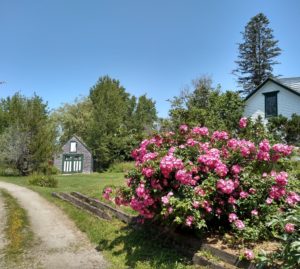
Maria’s house
My attic bedroom was up a narrow staircase with high risers and shallow treads. The one bathroom is downstairs, so a couple of times a night I was hauling myself back up the stairs with the help of a rope banister. But the bedroom was bliss and I slept soundly every night, after indulging myself in Wodehouse. (Maria has the complete collection, and it’s like a box of See’s chocolates.I read two of his novels in a row, and discovered that’s too much Wodehouse.)

Whenever I’m away from home, especially by myself, I sleep really well; perhaps because no home or family concerns call for my attention. I also work prodigiously. In two weeks in Maine I wrote a 15-page talk for a presentation in November, a short article about longleaf pine restoration, and a chapter of my fourth novel, as well as five 1200-word essays for the residency application, which I had to reduce to 1200 characters each when I realized I had misread the application form. It was flowing, and I was extremely happy.
At Maria’s I rose each morning about five and worked a few hours until she emerged. Her summer was very busy. She and her sister Ani had just finished revisions on a screenplay, a comic family thriller set in Eastern Europe. Luke, who is a cinematographer, was checking it over and correcting formatting before they sent it back to the producer. Difficult discussions were underway about casting. I loved being privy to all this glamorous drama.
Maria’s daughter Adriana has a thriving yoga studio. Maria went to yoga every morning and took care of the eight-year-old twins every afternoon after their summer camp. A Monopoly game was in progress on the living room floor. Dylan had Park Place and Mia had Boardwalk; somebody had hotels on Mediterranean and Baltic. When they took a break from climbing trees, swimming in the quarry, exploring outside and writing in their nature journals, they sat on the floor fiercely disputing trades and deals.
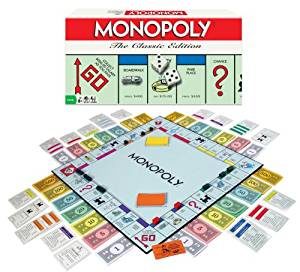
Every night Maria and I had dinner with Esther. The three of us took turns cooking. After dinner we played Scrabble. Maria won once, I won once, and Esther won five times. She is gleeful when she wins, her gloating barely concealed by sympathetic comments about our crummy letters.
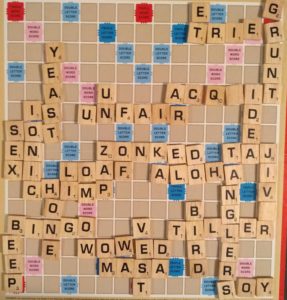
One night Gabe joined us; I had barely seen him since his wedding to Adri. That night I learned how funny and interesting he is. He told hilarious stories of the Rockland to Vinalhaven plane – he commuted to his editing job in Boston when they lived on the island year-round.
We had tea with Maria’s friend Lorraine, joined by another friend, Alex. Lorraine’s house is modern and dramatic, with a fireplace of huge granite rocks fitted together like a jigsaw puzzle. It overlooks a cove, and we briefly sat on the deck before the mosquitoes drove us inside. Lorraine served tea, cookies and sweet raw scallops dressed with lemon and olive oil. I couldn’t get enough of them.
We had gratifying conversation about my book, and lots of talk about the New York arts scene. Maria and Esther both have friends among leaders of major arts institutions. The cultural elitist in me is awed. I’m also amused. Like many creative people, my family tends towards shabby and broke, yet they hobnob with people who attend museum galas.
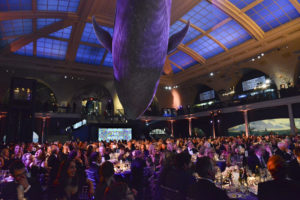
Without a car and with family so busy, I made frequent use of Vinalhaven’s lone taxi. Jeanne would pick me up at the library on a moment’s notice. Better than that, we instantly discovered we are kindred spirits. For many years she taught art and English at the Vinalhaven school; she has writing aspirations and a strong lefty-feminist streak. I was foolishly proud to have made my own friend on Vinalhaven, instead of just tagging along to meet my family’s friends.
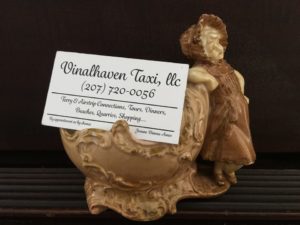
Maria’s husband Chuck and their son Cristian were arriving Saturday, so I moved into our rental house. It was very sleek and new, and quite cheap because it was several miles out of town and not on the water, but on a steep rise above the road, looking out into fir trees. It didn’t have the charm of my family’s old farmhouses and cottages, but it was set up perfectly for everyone’s privacy. I had a happy night and morning all by myself, and then Jean took me to the last ferry to meet Joe, Amanda, and my son Eric.
We amused ourselves together and separately. Joe and I swam in the quarry and the icy Basin. I swam in the Bathing Hole, muddy at low tide but cold and salty. We went for a short hike together, and he went kayaking twice – eagles and ospreys and seals.

image daniel lee at pexels.com
Eric was sick and couldn’t do all the vigorous Maine things he loves. Though he’s very self-sufficient, I’m sure my fretting was curative. Amanda slept a lot and immersed herself in wifi, as she does at home. But at night she went off with the older, college-age cousins.
Long ago, when Amanda was nine, the older cousins went rock-climbing. They told the young ones they were going to talk about adult things; if they didn’t know what puberty was, they couldn’t come. Amanda knew all about puberty, but poor 7-year-old Gus and his little brother were excluded. From then on, Amanda was part of the big kids. Now it’s not rock-climbing, but hanging out at somebody’s house until early morning. I’m glad she’s included.
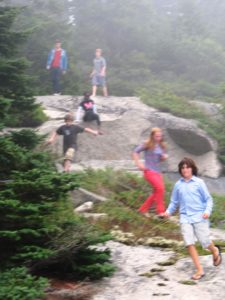
2012 – children flow downhill
As family members arrived, we shared dinner or desserts, and then played games. The Minister’s Cat – everybody claps in rhythm, and we go around the room, “The Minister’s Cat is atrocious, The Minister’s Cat is beautiful, The Minister’s Cat is cadaverous….” If you can’t think of a word or keep up with the rhythm, you’re out. The adverb game: one person leaves the room, and the group decides on an adverb. Ze returns and tells people to perform actions – Ben, write a letter – Luke, wash your hair – in the manner of the adverb. Then ze has to guess the adverb. Don polishing Joe’s shoes amorously is a sight I’ll never forget.
On our last night I prepared the family dinner – there were 15. I made a salad and my much-praised beef stew in a newfangled oven that had me cursing. For some reason the potatoes and carrots weren’t thoroughly cooked, but no one complained. People brought ice cream bars, popsicles and cookies. Afterwards some played a wild card game called spoons – I don’t know how it worked, but every once in a while there was a mad scramble to grab a spoon from the table. In another corner was a more sedate game of Uno.

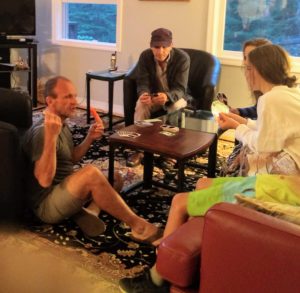
I love that there are no televisions in my family’s houses; that people don’t hide their faces behind their phones. I love that people from 7 to 87 play nerdy games with enthusiasm and hilarity. I love the harmonizing singing sessions, with songs old and new. I love that writing and art are seen as essential endeavors. This is my family’s culture, and I feel at home in it, though I have moved into a different world.
To take your car on the ferry from Vinalhaven, you must call at 5:30 AM the day before. You must arrive half an hour before departure; one minute late, you’ll go to the back of the line, and your car won’t make it on to the ferry. We took the 8:45 ferry, which left at 8:15 because Main Street in Rockland was going to close for the Lobster Fest parade, and we were in line five minutes early. Maria, Luke, and Michael showed up to welcome Paul and his new wife and stepdaughter coming in at 7:45 and.say goodbye to us.

I always get tearful riding away on the ferry through the cool morning, looking back at the harbor with its lobster boats. So many memories of so many summers: Richard and Esther sitting on the porch in the morning, everyone dropping by for coffee and conversation. Children, and all of us, swimming in the quarry. Long talks with Esther over coffee, and her annual Summer Open Studio, where Joe and I always fall in love with at least one painting. Luli at the lobster roast the night before Luke and Lisa’s wedding, sitting on the ground and eating five lobsters plus two tails. Lobster rolls at Greet’s Eats, where the boats pull in and dump their lobsters into the tanks. My nieces and nephews grown into middle age, their children going to college, having children of their own.
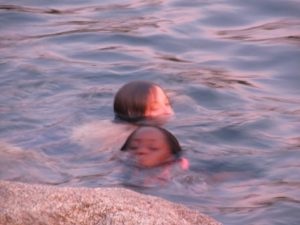
Amanda and Frances – sunset swim in the quarry
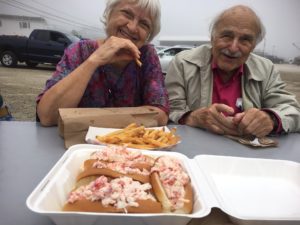
Lobster rolls with Don
They are sweet tears of memory and sad tears of loss. Richard died around Thanksgiving five years ago; Luli died two years ago on his birthday, August 16. Only Don and I are left. Every death leaves a hole with a particular shape that no one else can fill. But I’m so grateful to have my two sisters-in-law, Esther and Doris, and that my nieces and nephews have taken me in as a kind of sister. Now we have more family, as Verushka and Leilani join my great-nephew Paul. I hope I will get to know them, and I plan to travel to my magical place for many years to come.
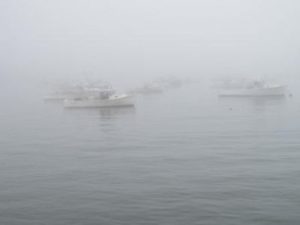
A magical place
Jul 3, 2019
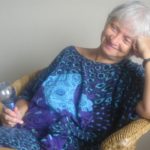
I met Mary Anne Hilker in 1980, almost forty years ago. We began as colleagues on a three-year grant to study child support enforcement. We shared an office, as well as the hard work of carrying out the overblown, poorly-designed research. In an organization dominated by men we shared outrage and laughter, as well as stories of her marriage and my ceaseless honey-hunt. In the course of our long friendship we have shared a great deal more.
When my son was twelve he went with my boyfriend on a weekend fishing trip in the Gulf. In the middle of the first night the boat began to leak, and my son and the four men spent the next ninety hours clinging to the overturned boat, without food or water, subject to rain, lightning and the merciless sun. Shortly before the Coast Guard helicopter rescued them on Tuesday evening, one man died. Meanwhile, my own weekend was carefree; my ordeal didn’t begin until their failure to return on Monday night. (read Mother/Ocean, my poem about the accident. https://elizabethmccullochauthor.com/?s=Mother%2FOcean )

image: uscg.mil
My memories of that time are mercifully fragmented and confused. The small hospital in Crystal River was overwhelmed by four victims at once. Recently Mary Anne reminded me, as we reminisced about nasty motels we had known, that she had stayed with me in Crystal River until my boyfriend was discharged from the hospital, in a motel that earned the Nastiness Blue Ribbon.
Mary Anne and Larry didn’t have children. There is an unbridgeable chasm of understanding between people with children and people without. I’ll never forget, when I was complaining about some outrageous prank by my then 16-year-old son, how Mary Anne asked why I didn’t just kick him out. She understands now. In their early fifties the Hilkers became foster parents and took in two adorable and accident-prone little boys. Then they got an eight-year-old boy, followed a year later by his newborn sister. The agency sent the boy elsewhere, but the Hilkers adopted the girl a year later. That was eighteen years ago.
Meanwhile, my own former foster daughter had a baby, who lived with us at intervals until we adopted her at age seven. The two girls consider themselves sisters; as my granddaughter Amanda says, “She’s known me since I was born.” I can see them, ages four and two, toasting marshmallows in the fireplace, covered with white goo, particularly fetching on Amanda’s dark skin. I see them parading around the living room, Ariel in her mermaid costume, Amanda in a yellow Cinderella dress. Sharing a cabin at Roosevelt State Park in Georgia, roller skating around the lake, marshmallows again at the campfire.

FDR State Park, Georgia
Squabbling, estranged, coming back together closer than ever. And I see me and Mary Anne over the years sitting in our special corner with glasses of wine, sharing the obsessive joys and worries of parenthood. Schools. Bullying. Boys. Our hopes and fears for their futures.

We didn’t only share troubles. We traveled for pleasure, to New York and New Orleans, Denmark and England. In London and Bath we wandered through gardens and recalled together all our favorite English novels. On the city bus in Copenhagen we discovered that, contrary to all the guidebooks, not everybody in Denmark speaks English. In our little B and B, with our internal clocks askew, Mary Anne had to ask me at 2AM to please stop humming. We took the train ferry to Aarhus, and left our train below to sit on the deck, enjoying the breeze while I sipped aquavit, which we had discovered in Tivoli Gardens. Mary Anne went on ahead, but when I returned below as the boat docked there were THREE trains, and I had a tipsy time finding our train, our compartment, and Mary Anne, who was wondering if she’d ever see me again.

Tivoli Gardens at night. Image:guidedanmark.org
In New York we stayed with my sister Luli, in her cramped third-floor apartment on Eighth Avenue and Fourteen Street at the edge of the Village. Delicious food, long walks, hilarious, intimate talks. I was a little jealous of the rapidly-growing friendship between Mary Anne and Luli – the three year old in me cried, “She’s MY friend.”
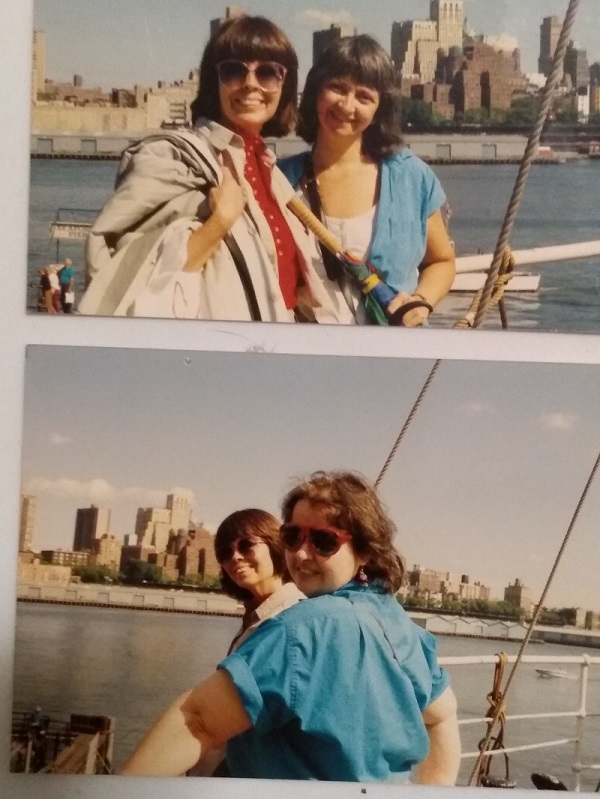
My friend or Luli”s?
Nevertheless, when Luli visited me in Gainesville I would arrange visits for just the two of them . And there was the memorable occasion when Luli, Joe and I lunched at the Hilkers’ with the two adorable boys. The three-year-old finished his slice of pizza and promptly threw up what seemed like a quart of vomit all over the food. It was a once-in-a-lifetime experience for Luli, who had always proclaimed her aversion to children. Mary Anne and I still laugh about the look on her face.
My long honey-hunt finally came to an end when I met Joe, and after four years we married. Our two families gathered the night before the ceremony at Mary Anne and Larry’s, in the back garden – there are few places lovelier than a Florida garden in October. Mary Anne and Luli prepared numerous side dishes and desserts, and we celebrated and feasted on burgers and hot dogs grilled by my nephews, two bushels of oysters, Mary Anne’s salads, and Luli’s desserts.
Mary Anne and I usually exchange birthday and Christmas gifts. She has given me memorable T-shirts, which I reluctantly discard when they are faded and torn.

I can’t bear to throw this one away
At Christmas I usually make her a tin of pecan brittle. She shares it with her family, but keeps a secret stash for herself. Sometimes we give books or notecards. Luli drew wonderful notecards. She hoped to sell them and make her fortune, or at least enough to support her cats. I bought them, and her friends bought them, but as with most creative enterprises, income was less than outgo, and she was left with an accordion file full of samples, which she generously shared with me in her last year. Now Mary Anne and I each have a collection. We both find it almost impossible to send them off, as there will never be any more.
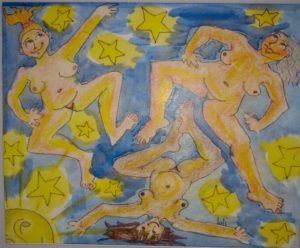
a Luli card
The hardest part of aging is the relentless succession of losses. Mary Anne’s sister died. My brother died. Her mother died. Luli died. While Mary Anne keeps her troubles to herself and refers to them only glancingly, she is my confidante, and though I come from a long line of stiff-upper-lippers, at times I have fled to her garden or our corner in the living room and poured out my woes. I don’t think I was much comfort to her as her family dwindled, but she sustained me through the months of Luli’s dying.
Like me, Luli was a writer, and we cheered each other on. She had instant success with her first book, a lyrical story of a young girl who finds a glowing egg in Central Park. { Luli’s book https://www.amazon.com/Falcons-Egg-Luli-Gray/dp/0395711282 } She found an agent on her first try and, shortly after, a publisher, and the book was a Newbery Notable. She dedicated it to me, “For my sister Elizabeth McCulloch, who led the way.”
Mary Anne read the original version of my first novel, Dreaming the Marsh. She loved it, though she dismissed one character as a stereotype: another Black woman who cooks and says wise things. I was appalled and amused; that character has grown considerably since then. I waited thirty years for the novel to be published, and thirty years to show Mary Anne the dedication, “To Mary Anne Hilker, friend and first reader.” I kept my secret all those years, and when the advance readers’ copies arrived, I found Mary Anne in her garden, and pulled the book from my purse. She was as thrilled and I was as happy as I had always known we would be.
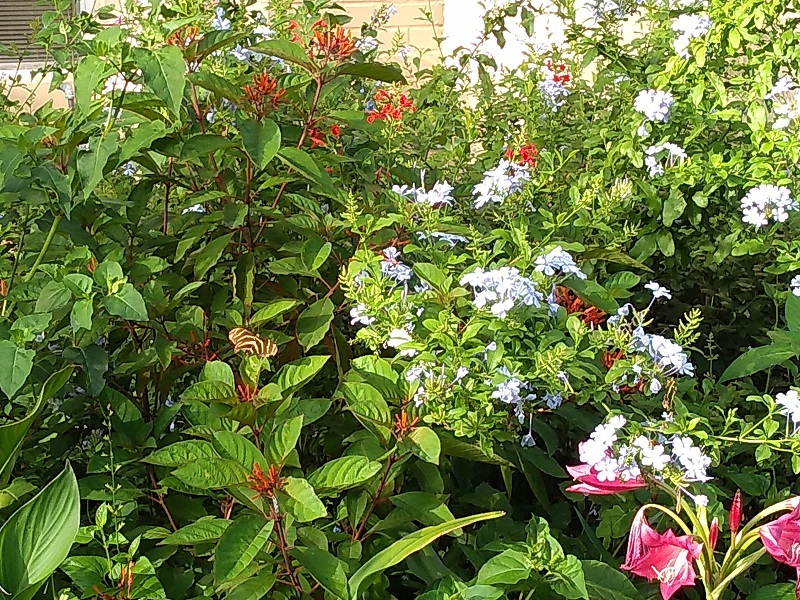
Mary Anne and a zebra long-wing were waiting for me
Mary Anne is a voracious reader, and a gifted gardener. Now retired, with her daughter grown, she can focus on books and the garden. She also volunteers at the Marjorie Kinnan Rawlings homestead in Cross Creek, dressing in a 1940’s housedress, and taking small groups through the house and around the garden and orange grove, sharing everything she knows. She knows a great deal, as she has read everything there is to be read about the author and her works.
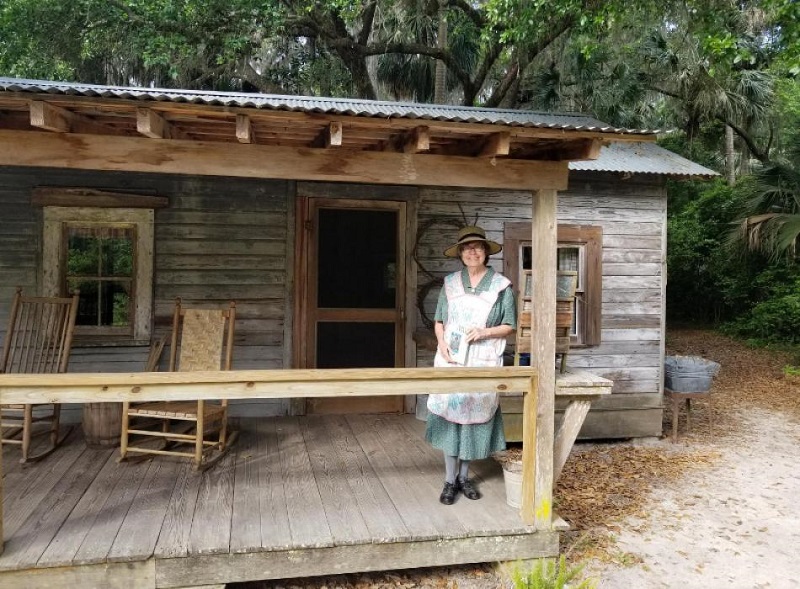
Mary Anne at the Rawlings tenant house
Rawlings, though a non-native, wrote about Florida as well as any of the greats. She shared the prejudices of her era, as I surely share the prejudices of mine, but she is part of this state’s literary story. Her very modest cracker house, with the separate kitchen, is arranged as it was. The front porch is set up for her writing, typewriter on the table, chair facing out so she could see the occasional neighbor go by on County Road 325 and smell the tea olive shrubs by the door. Only the glass of bourbon is missing.
Recently Mary Anne called to tell me that the park ranger at the homestead wanted to meet me, and arrange a reading after my book is published. There may be more thrilling news to come, but I can’t imagine what it would be – a Nobel, perhaps?
The house itself is not accessible – even if they put ramps at the entrances, the narrow doorways and passages won’t accommodate a wheelchair. But the grounds and barn are accessible. That’s where the docents give their talks, and that’s where I will be speaking.
Mary Anne and I went out to meet with the ranger, Geoff Gates, and the park manager, Scott Spaulding. We were all enthusiastic – Rawlings wanted her house to be a center for writers, not just a museum, and they had long sought a way to begin that project. As for me, I feel I am being welcomed into the long tradition of writers who celebrate Florida – its beauty and natural wonders, its peculiarities, and the ordinary people who inhabit this extraordinary place.
After the long talk about plans and possibilities, the two old friends had to celebrate, and Mary Anne knew just the place. In Citra, hidden away inside Grand Lake, a golf resort of mobile homes and trailers, overlooking Orange Lake, is The Eagle’s Nest. You would never know about it unless you already knew about it.
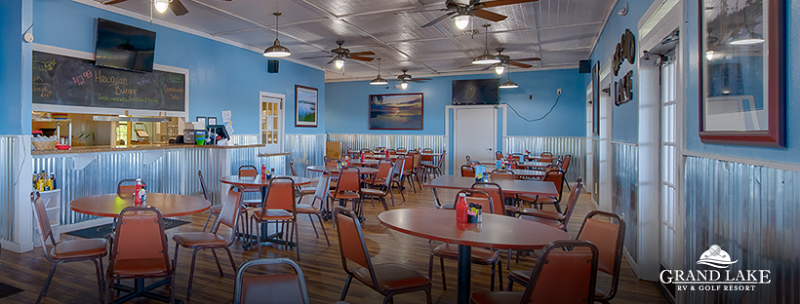
The Eagle’s Nest

Orange Lake
The menu is ordinary – fried fish, burgers, salads – but everything is perfectly prepared. I have long sought the perfect onion ring, and I found it here. The collards are as good as they get. (I love greens.) We ate too much, talked about everything, sat a long time looking out over the lake. It was our first expedition together in many years. We were celebrating my book – Mary Anne is as excited about it as I – but more than that, we were celebrating our long love and friendship.
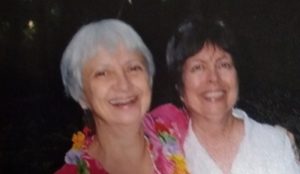
We’ve become blurry with age
May 16, 2019
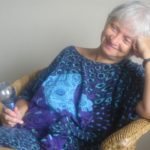
In May, Joe and I went camping at Cumberland Island, a barrier island just north of the Florida border. Although there is some private property on the island, 18,700 acres have been set aside for the rest of us. No cars allowed, just people and bicycles, and lots of wild horses.
The world has so many beautiful places; this is one of them. A boardwalk traverses wide dunes to a long, empty beach. Salt spray discourages the live oaks from growing high, and their limbs twist to reach the sunlight. Underneath are palmettos, each frond with its population of tiny green frogs with large voices.

 images: National Park Service
images: National Park Service
Only 300 visitors are allowed on the island at a time, so campsites and ferry tickets must be reserved many months in advance. There were few campers at Seacamp in midweek, and the beach near the campground was almost empty; back-country campers go to beaches farther north on the island. Loud groups of school children arrived for daytime field trips, but we didn’t see or hear much of them. They were usually leaving as we went to the beach in the late afternoon.
The entrance to our campsite curved through the trees and underbrush so it was hidden from the trail. No water spigot, but there was a fire ring, a picnic table, and a high cage for all our food and sweet-smelling toiletries. We hung our trash bag from the cage temporarily, thinking no scavengers would visit while we were in camp, but one well-fed raccoon came in boldly and chewed a hole in the bag and another jumped on the table to get to our toothpaste and soap.
On the first morning I rose at five-thirty and boiled water for my coffee. I set out my big insulated mug and turned away to fill the cone and filter with coffee, then put them on top of the mug and poured the water through. The fifteen-minute walk to the beach through the twisted live oaks, the sky just beginning to brighten, brought memories of Amanda. We took her camping at Cumberland Island when she was seven, and as she and I walked to the beach at dawn, and saw the brilliant colors through the trees, she began singing ‘Mister Golden Sun, please shine down on me.’ click

I walked across the broad empty beach past rippling tide pools to the edge of the water, and watched the sky change. The sun was soon up, but it was another twenty minutes or so before a thin gleam outlined the dark clouds on the horizon. I drank the delicious, strong coffee. In my loudest tenor I sang what I remembered of a song from my youth – ‘Sun arise, she bring in the morning…’ by a now-disgraced Australian singer. It’s an old song, a chant and a rejoicing. click (the comments following the video debate the propriety of enjoying art by bad guys)
I was purely happy, alone on the beach for half an hour, watching daybreak. Just a moment before the sun rose above the clouds, I heard someone walking up behind. I turned, and it was Joe. He hadn’t had his coffee, so I offered him my last swig. He took it gratefully, and then spat. “There’s something in it.” It was an inch-long caterpillar, boiled. It had fallen into the mug as I put coffee in the cone. I had been drinking caterpillar soup.
 Dawn post-caterpillar: still cheerful
Dawn post-caterpillar: still cheerful
We walked back to our camp along the boardwalk through the twisty oaks, past the bathhouse, down the trail. I tried not to think about the caterpillar. We met a woman and told her about it. “It touched my lips,” Joe said with horror. She answered without hesitating. “You kissed a caterpillar.” I was so impressed. When I encountered her again the next day, at the bathhouse with her husband, I praised her wonderful attitude toward life. “She finds something good to say about everything.” her husband said. He didn’t seem to appreciate this, but it put a cheerful song in my head. click
Florida beaches are too hot from morning to late afternoon, so after breakfast we walked along the River Trail through the woods. Surprisingly, mosquitoes don’t seem to be very active yet; they only troubled us for about half an hour at dawn and dusk. It was a beautiful day for walking, with a soft, steady breeze.
The trail took us to Dungeness dock, and the broad pasture where wild horses graze. When we were there with Amanda, she saw a stallion’s imposing penis, and I explained, though I feared it could make sex scarier than it already is. Now it was the height of mating and foaling season, and the first thing we saw was a grazing bay mare with a white foal suckling beneath her, a bay stallion grazing a little distance away.

I was tired from the walk, though it was under a mile, and sat on a bench watching a dozen horses grazing, rolling in the grass, trotting around, while Joe took pictures. I was reading the park brochure when Joe called, “Look up.” I searched the sky for birds, but then heard hooves, and looked across to see the stallion galloping straight towards me, followed by the mare and foal. He hadn’t read the brochure about staying 3 bus-lengths away from people. I sat frozen, nothing to be done, but fortunately he turned about eight yards from me, and the family circled the field.
 Feral horses grazing at the ruins image: National Park Service
Feral horses grazing at the ruins image: National Park Service
We walked on to the ruins of Dungeness, a mansion built by Andrew Carnegie. Joe headed to Raccoon Key, where he saw thousands of crabs swarming on the sand. I walked the mile back to the camp, exhausted and blue because my stamina is gone. As always, a song came to me, and cheered me up a bit, and I could sing freely on the empty trail.
I love camping. I like the way daily activities become a slow ritual; showers, toilets, and potable water were a ten-minute walk through the woods. I like being outside in the dark under the stars. I like playing cribbage by lantern light.

I tried sleeping in the tent, but the ground, even with the Thermarest mattress, was too unyielding for my left bad hip and my right bad shoulder, and wouldn’t make room for my butt. So I slept outside in the string hammock, and I was blissful, looking up into the sky and stars until I couldn’t keep my eyes open. The frogs sang all night and the birds began before dawn.
It was wonderful, but this may have been my last tent-camping trip. I have less energy than I used to, and I need to sleep well at night. I can still spend parts of the night in the hammock in our backyard. I can still sit outside at dawn and dusk. And I can still remember, and sing the songs that cheer me. click
Mar 30, 2019

My sister-in-law, Doris, is perhaps the most literate person I know. When someone at her retirement community invited her to join a “Great Books” reading club, she took a look at the list and realized she had read them all, except for Gibbon and War and Peace, so she declined. Recently, dismayed by the state of the nation, she is focusing on non-fiction, the denser the better (though I think she’s still taking a pass on Gibbon).
 Perhaps we should read about declining empires image:penguinrandomhouse.com
Perhaps we should read about declining empires image:penguinrandomhouse.com
She may also be the hardest-working person I know. At 81, Doris runs an editorial service, translating from German and French, editing manuscripts and helping authors find publishers. Self-employed, she is a demanding and relentless boss. On a recent visit she told me defiantly that a journal editor would “just have to wait” for her translation of an article on dementia. He had sent it to her with no warning just before she came to Florida for a week’s vacation, and she couldn’t get to it until she returned home. It wouldn’t be back on his desk until ten days after he had sent it.
I love going for walks with Doris. She can name every wildflower and tree. When she is deprived of walks by dreadful weather (they’ve had a very rough winter), she suffers greatly from being cooped up inside. Her only exercise then is yoga, Zumba, and fiercely competitive games of ping pong in the basement of her building. At the New Years Eve party, she choreographed and danced La Bamba with two other women, while her husband (my brother Don, age 91) sang. After a long phone chat with Doris I sometimes have to lie down to recover from vicarious exhaustion.
 image: josh sorenson at pexels.com
image: josh sorenson at pexels.com
It was Doris who introduced me last year to the Oxford English Dictionary Word of the Day. click It is now my daily treat. Almost all the words are new to me, and whenever I find one that delights me, I add it to a steadily growing list. Unfortunately, I can never use the words in conversation; no one would understand me (except, perhaps, Doris). Therefore, Gentle Readers, I am sharing some of them with you. Though I have shortened the definitions, if you don’t enjoy dictionaries you may want to stop here.
Some words I love for their meaning: Quob [To throb, palpitate] – such a sexy word. Cwtch (rhymes with butch) [a cupboard or cubbyhole, cuddle or hug].
Some I love for their sound: Pisculent [Full of fish]. Puckeroo [Useless, broken]. Quagswagging [The action of shaking to and fro].
 pisculent image: alesha loben on pexels.com
pisculent image: alesha loben on pexels.com
I love a few words because I never knew we needed them, and they make me laugh. Demonachize [To remove or drive monks permanently from (a place). Zedonk [The hybrid offspring of a zebra and a donkey]. And my favorite, Hippanthropy [The delusional belief that one is a horse]. Obviously, we need a new word, Zedonkthropy.
 Gainesville (GA) Times – baby zedonk at Chestatee Wildlife Preserve
Gainesville (GA) Times – baby zedonk at Chestatee Wildlife Preserve
in Dahlonega, GA
One word we clearly need is resistentialism [The theory that inanimate objects are hostile to humans], though I don’t know why they call it a theory. How do you think I got all these bruises?
Many words on my list would help me in Scrabble if I could ever remember them, but alas, I suffer from obliviscence [The state of having forgotten, forgetfulness].
I love the words that are useful in Florida summers. Summerful [Full of summer; summer-like, summery]; oam [Steam, vapor, condensation; warm steamy air, heat haze]; mafted [oppressed or stifled, especially by the heat].
 image: Anderson W Rangel on Unsplash
image: Anderson W Rangel on Unsplash
There are many words I could use if I cared to write an essay about the President. When, disheartened and without much knowledge of history, I fear that we are in a time worse than any that has come before, I now have many venerable words that apply to The Rump, and am oddly cheered to think that parlous times are nothing new:
Ampullosity [Swollen or pretentious inanity; turgidity of language, bombast]; Boation [Bellowing, roaring; a loud bellowing noise]; Jactance [Boasting; vainglorious speaking]; Ondful [Malicious; spiteful, envious]; Homophily [The tendency of people to be drawn to or seek out those they perceive to be most like themselves]; Realia [Real things or actual facts, especially as distinct from theories about or reactions to them]; Imaginarian [A person concerned with imaginary things]; Jeel [Trouble; mischief; damage. Frequently in ‘to do jeel.’]; Jabroni [A stupid, objectionable, or ridiculous man; a loser, a knuckle-head]; Badmash [A scoundrel, a rogue; a miscreant; a hooligan, a ruffian]; Wanwit [A fool].
 image: History in HD on Unsplash
image: History in HD on Unsplash
My only objection to the OED Word of the Day is that it so often turns my thoughts to The Rump. But it has also revealed to me that I am a verbarian [A person who is interested in words]. Writing this was great fun, my version of sport. (I think I am now officially old.) So thank you, dear Doris. You are indeed a walkative [Inclined to walk; characterized by walking] verbarian, and a beloved sister-in-law.
 A walk at Paynes Prairie – Joe, Liz, Don, Doris
A walk at Paynes Prairie – Joe, Liz, Don, Doris
Feb 15, 2019

Since September last year I’ve repeatedly told you that my novel will be published in September this year. “Why does it take a year?” people ask. I thought you might like to know what happens in between signing the contract and the glorious day when the book is born. I’ll tell you the highlights so far. The funny thing is, it’s almost all highlights.
My first joy was joining the Authors Guild. Since nobody agrees on the difference between ‘writer’ and ‘author,’ I’ve got my own: an author is a published writer. My late sister Luli Gray was a member of the Guild, and I would read her monthly newsletters and long for the day when I could join. Until a couple of years ago, only published authors or those with a book contract were eligible. For thirty years or so I’ve been on the outside looking in, nose pressed to the glass, admiring them.

So as soon as I received the proposed contract I joined the Guild, and the first thing I did was ask for their free legal advice. I was astonished by the speed and thoroughness of their legal team. They explained the effect of all the provisions and proposed several changes. For $135 annual membership fee I received what I estimate was about ten hours of expert legal advice.
But wait…there’s more! The Authors Guild has an online members forum, and it was there I began to connect with other authors. I received helpful advice about publicity and working with book clubs. Beyond that, I felt I had found the people who understand what it means to be a writer, who are dealing with the same thrills and disappointments as I.
Of course, there's a fair amount of whining, and an occasional thread filled with severely beaten dead horses. (Writers in the procrastination phase of task achievement like to get caught up in online debates.) But I began to make friends and exchange emails with a few who seemed to share my interests. I’ve bought books by three of them, and reviewed two.

The Authors Guild Community Forum
The long years of trying in vain to be published were often discouraging, but there can be advantages in waiting so long. First, there’s the absolute bliss when the time finally comes. Next, as an old woman, I’ve accumulated a lot of fuel for my imagination. And I admit it: I think I’m wiser than young-uns. (I’m sure they believe they’re wiser than I).
 I'm wiser but they're cuter
I'm wiser but they're cuter
Finally, because I spent most of my adult life earning a good living and a good retirement account, I don’t have to worry about making money. Writing, always a life of penury for most, is becoming even less profitable. According to research by the Codex Group for the Authors Guild., authors' median incomes have dropped 42% since 2009.
Along with that, it’s harder and harder to get one’s book noticed. The internet, streaming media, and goddamsmartphones occupy many minds, while the growth of self-publishing floods the market with books. So authors who can afford it hire publicists, and I can afford it. I gave myself a generous budget to do everything I can to promote this book.
I followed recommendations from writer-friends and people I met on the Author s Guild, and interviewed five publicists. The process was painful for me – I felt everything was riding on the decision, and it cost so much! But finally I settled on a firm that Authors Guild friends had praised in detail, and that firm in turn recommended a website developer.
 Publicist
Publicist

Designer
Now I had a team of three: publisher/editor, publicist, and website designer. To my non-surprise, it was all women. I’ve fallen in love with them all in the course of long phone calls and many emails.
Joan Leggitt at Twisted Road Publications – I knew I had found the editor of my dreams long before she decided to publish my book. When I first submitted it, she told me that magic is fine, but it has to be an integral part of the book. I rewrote the whole thing. My sardonic coffee shop owner became a powerful mystic and visionary; I added more magic and related it to my main characters. I submitted the book again, this time successfully. Then, as we worked together, she suggested one more major change, in the relationship between the twin sisters. I was dubious, but said I’d give it a try. Now I saw that the twins had been cartoon characters. With the revisions, they came to life. I was, and am, awed by Joan’s gifted eye.
Three more edits followed, by Joan and two others, calling for clarifications or pointing out inconsistencies. I had to master the review function in Word, tracking, rejecting, accepting changes. The work was extremely tedious, and brought me to curses and tears, but I was impressed by the editors’ ability to spot tiny important problems. (The last editor presumed to tell me what my characters were thinking and were likely to do, and sometimes wrote new material. I did NOT appreciate that, but she did point out the mysterious disappearance of a biscuit.)

one of many comments
Writing is such a solitary pursuit; like God, we make something from nothing, and we do it alone. Now I had a publisher, who cared about my book as much as I did, and thought about it in the middle of the night.
I had to write a brief bio, dedication, and acknowledgments. The acknowledgments are complicated – I keep acquiring more people to thank – but the dedication was easy – thirty years ago when I finished what I thought was the final draft, I wrote my dedication. I would think of it wistfully from time to time. Now I can’t wait for the day when my dedicatee opens the book and sees that page.
At the same time that I worked on edits, I was responding to requests from Monkey C. Media. I had to think about new things, and answer long questionnaires. Appearance: How about these colors – what about this font? Strategy: What benefit will readers get from it? What action do you want them to take? Write 15 questions and answers for the press kit. Write the About page. We need professional photographs.
More fun, and another woman who is becoming a friend. Adrienne Fletcher, a graduate of the Savannah College of Art and Design, met with me for over an hour at her studio – she wanted to get to know me – and then shot what seemed like hundreds of photos in my backyard about a week later, at the hour of golden light.
Blurbs. Gotta have blurbs. Those are the little quotes from other authors that you see on the back of books: ‘compelling, intelligent and sensitive’ ‘makes Jane Austen look like a piker’ ‘the greatest creative genius since God rested.’
 The Creation image: catholic.org
The Creation image: catholic.org
Authors HATE writing blurbs, or that’s what I’ve heard from more than one. I know very few authors – I had two blurbs promised, but I needed more. That’s why I decided to start reviewing books. I would only review books I was enthusiastic about – there’s not much point in saying “Here’s a book you’ve never heard of and it’s not worth reading.” I didn’t see it as a trade-off (say nice things about me, and I’ll do the same for you) – but as a way to connect with authors. It would be hard to write to a total stranger and ask for a big favor.
This enterprise has only been slightly successful. I received very gracious refusals from several of my hoped-for blurbers, citing deadlines, illness, family troubles. One announced on Facebook shortly before I wrote her that she was no longer doing any blurbs. However, to my delight, I’ve discovered that I love writing reviews. I read more attentively, and I learn a lot by thinking about how other authors do what they do. I’ve decided to start a second blog – Big Books from Small Presses . Like this one, it will link to my website.
I confess I’m a bit worried about the amount of work I’m committing to. I’m working hard 4 or 5 hours in the morning, and often a couple of hours at night. My work with the publicist is about to begin; one of their key responsibilities is assigning me tasks. I didn’t realize when my author life FINALLY began that I was embarking on a full time job. And in this gestation time I’ve only had two days when I could turn to my fourth novel. But when I did, the ideas flowed and the words tumbled out. Now that my book is being published there seems to be a point to it all.
My retirement is over. In the kitchen, in the shower, on a walk, writing ideas or writing business keep popping up. On my magic whiteboard is a long list of things to do. It’s magic because it’s a gift from a Wise Woman – she’s so wise that I simply have to make it upper-case – and I feel her presence in my office as I work on the bed, snuggled by Moe and a blanket, with the whiteboard beside me. I have never been so happy.
 image: A. Jennings (the rubber chicken belonged to my late sister, Luli)
image: A. Jennings (the rubber chicken belonged to my late sister, Luli)
 image: shelterlistings.org
image: shelterlistings.org picketing City Hall
picketing City Hall image:Vermontdirtroad from Arupa’s blog
image:Vermontdirtroad from Arupa’s blog The art fence
The art fence Primary Colors
Primary Colors Getting goodies at the HOME Van
Getting goodies at the HOME Van































